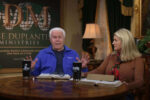There are 1.3 billion people in China today, and most of them don’t know Jesus Christ. Charisma sent a reporter there to learn how much work we must do to reach the world’s most populous nation.
The first day of my journey into China’s most remote region begins in Hong Kong. I came here with a tiny plastic bottle that is holding something so special that I hand-carry it across the border. It holds water from a lake near my house, along with some anointing oil from Israel. My pastor has prayed over it. Intercessors
have laid hands on it. This bottle to me represents the power of the Holy Spirit.
If I’m stopped at the border, how can I explain that the Lord told me to take this water to the arid Gobi Desert and anoint the land? That desert is symbolic of the spiritual condition of the Uygurs (pronounced WEE-gurs)–the unreached people group that my team of undercover prayer warriors will endeavor to pray for
during the next 14 days. There are 9 million Uygurs in China and only 50 known Christians–0.0000055 percent of their population.
The Uygurs are the largest people group in the world that does not have a complete Bible in their language (they speak Uygur, not Chinese). They have no pastor. No evangelist. There is not a single church in their region.
Because they are Muslims, they have nothing in common with average Chinese and are outside the reach of most evangelism efforts. By all criteria, they are completely untouched by the gospel. Every hour seven Uygurs die. They will spend eternity in hell without ever hearing about a God who loves them and died for them.
Am I fooling myself? Can our little team of four intercessors make a difference in the face of these horrifying statistics?
DAY 2: Xi’an
We arrive in Xi’an, a city on the western end of the ancient Silk Road. For thousands of years, traders traveled this route linking China and the East, exchanging not only silk but also ideas and ideologies–including Christianity and
Islam.
In a few days, we’ll catch a train and retrace this route to remote northwest China where the Uygurs live. Meanwhile, we locate an obscure tablet commemorating the Nestorian Christians, who first brought Christianity to China in the seventh century.
The church they planted among the Uygurs lasted until the 14th century when Islam dealt it a deathblow. Our team member Brandon prays, thanking God for the Nestorians and asking for the honor of continuing their work among the Uygurs.
I’ve traveled with Brandon, Ruth and Glenn on previous prayer missions. Brandon is a former pastor who now works with a mission that leads short-term teams. Glenn, a builder by trade, is our evangelist and exhorter. My friend, Ruth, is a prayer warrior who was delivered from an occult background.
We think about the Nestorians and what it cost them to share their faith. Suddenly, our two-day train ride across the desert doesn’t seem so formidable.
DAY 4: Train across the desert
Our train crosses Xinjiang Province–637,000 square miles of steppe, desert, lush oases and snowcapped mountains. Desolate villages dot the vast Taklimakan Desert, which translates, “Once you go in, you won’t come out.”
Is there a way out for these people? Jesus is their only hope. I stand by the window, weeping for people we pass; people who look hopeless, with no way out of their misery and squalor; people who have never heard the name of Jesus.
The Uygurs have been forcibly taken over by one country after another. Most recently communist China took over and with a stroke of the pen millions of Uygurs became Chinese citizens. Ethnically Turkic with their own language, customs, writing and history, the Uygurs now must serve an oppressive government trying to stamp out their claims to sovereignty.
I brush my teeth in the communal sink and meet my first Uygur, a young Muslim woman anxious to practice English. I invite her to our compartment, and we munch on snacks. Just as I start
telling her about Jesus, her husband gruffly calls from the corridor, and off she goes with an apologetic look.
DAY 6: Urümqi, Xinjiang
Province
We have now arrived about as far away from home as we can get–Urümqi, the capital of Xinjiang Province. This modern metropolis of 1.5 million is farther from the ocean than any other city on earth.
Reaching Unreached Nations (RUN), a U.S.-based ministry, told us there is an enormous need for intercessors to come and pray and move the “rocks”–strongholds keeping Uygurs from the Lord. So we head for our first assignment, an enormous rock called Hong Shan, considered to be Urümqi’s gateway and highest point. City gates are strategic places to prayer walk because they are entrances to the city, where both good and evil come in. High places are often sites of idolatry and demonic worship.
We climb to the top of Hong Shan, where a demonic obelisk stands. We anoint it with oil and pray that the spiritual strongholds binding this city would loosen their grip. We read Scriptures and proclaim God’s blessing over the Uygurs, rejoicing in His promises for them.
The percentage of Uygurs in this province has dropped dramatically in the last two decades because the communist government has forcibly relocated
8 million ethnic Chinese here to “dilute” the Uygur population. A city that was once 90 percent Uygur is now only 10 percent. They abhor their Chinese oppressors, and anger, deceit, violence and disunity are major strongholds. Yet among the relocated
ethnic Chinese are born-again Christians, and we ask the Lord to show them the need to evangelize their Uygur neighbors.
We head across town to Er Dao Qiao, a Uygur market, and silently pray in the Spirit for people passing by. We hesitantly smile at people and say hello in Uygur–Glenn and Brandon to the men, Ruth and I to the women.
Uygur men assume that all Western women are like the immoral characters on American TV programs shown here. Ruth and I don’t make eye contact with men, or our intentions will be misunderstood.
Most Christian expatriates living here are women, yet Muslim culture means they cannot talk with the men. We ask God to raise up men to come and reach Uygur men.
DAY 7: Urümqi
This morning our team heads for a prayer walk at Tian Shan (Heavenly Mountain) Lake. At 6,000 feet above sea level, the lake is ringed by stunning snow-covered mountains. It’s relatively secluded, so we bring our boom box, CDs, banners and Ruth’s shofar, and praise God with song, dance and Scriptures.
Yet I have such a feeling of frailty. Who are we to attempt what we’re doing? God reminds me that we are going in His strength, not our own, and that He has equipped us. Much of what we do here is in obedience and faith, without really seeing the results. But we know He is moving through us, even when we don’t see anything happening.
DAY 8: Kashgar
God shows us today what our prayers are accomplishing. Besides meeting one of the 50 Uygur Christians, we also encounter a foreigner who volunteers at local orphanages. “The Lord told me He sent prayer walkers here this week,” she tells us, “because in the past three days doors have begun opening for us that have never opened before.”
Tonight we catch a flight to Kashgar, a town on China’s border with Pakistan and Tajikistan. Kashgar fell to Islam in A.D. 950. Marco Polo reportedly visited here in the 13th century.
At the end of the 19th century, brave Swedish missionaries labored here, birthing churches in several locations. But Muslim persecution in the 1930s meant most of the men in the church were martyred, and the women were forcibly married to Muslim men.
That antichrist spirit attacks me
before I even step foot outside the hot and dusty Kashgar airport. A Uygur government worker insists on seeing a claim ticket for my bag, and she becomes argumentative when I can’t find it.
I’m hot, thirsty, exhausted and becoming angry. But slowly the Holy Spirit takes over my flesh and reminds me that the enemy will try to make us hate the very people we have come to serve. I smile at her, find the appropriate sticker and head into town with the team.
DAYS 9-10: Kashgar
I keep thinking we’ve arrived at the ends of the earth, but then we go a few hundred miles farther. Kashgar looks like a page from National Geographic–more like the Middle East than China. In fact, as the crow flies, we’re actually closer to Baghdad than Beijing.
Early this morning, we head for the famous Kashgar Bazaar, held every Sunday for the last 2,000 years. This is no tourist trap. More than 150,000 Uygurs are trading everything from sacks of pungent spices to camels, sheep, donkeys and horses. Our goal is to walk through the enormous bazaar, act like tourists and pray as we go.
As I look at the acres of brightly colored stalls, I’m amazed at how many Christian symbols are significant in Uygur culture: sheep, lambs, bread (considered so sacred that Uygurs won’t throw it out), water, vineyards and even death. Lambs are sacrificed on Korban, a Muslim holiday commemorating Abraham’s near sacrifice of Isaac. Who will tell the Uygurs–in their own language–that this redemptive analogy portrays Christ’s death for them?
The next day we drive to the Idkah Mosque, the largest in China, and walk around the outside of the ornate yellow building, praying as we go. To the throngs gathered here, being Uygur means being Muslim. We intercede for the millions held captive by a hopeless religion, people who believe their god is completely unknowable by man.
DAY 12: Turpan
Official Islam is hopeless enough, but in remote areas people also practice folk Islam–a jumble of traditional Islam, magic and superstition.
Outside our hotel, a street merchant sells amulets and charms as protection against curses, spirits and the evil eye. We see babies with charms on their shirts and hear horror stories of parents placing knives in children’s cribs to keep spirits away. Fortune-telling and animal sacrifice are common.
We drive to Turpan and learn about a nearby village called Tuyuk, where locals practice magic and folk Islam. They believe that Tuyuk’s graveyard is mentioned in the Koran and is therefore sacred. There is even a mud house where infertile women “pray” to be able to conceive.
Islamic holy men, or mullahs, practice magic in the graveyard. They do not like foreigners and often confront them abruptly.
Only a handful of prayer teams have ever gone to Tuyuk. I talk with my team, and we agree the Lord has brought us here to pray on-site for these people to be released from bondage to Satan. We retire to our rooms, pray and turn in for the night, ready for the spiritual battle the next morning. We know there is nothing about us that can make anything happen–but the victory is the Lord’s.
DAY 13: Tuyuk
Glenn has spent the entire night violently sick. He can’t attend our morning prayer time, but Brandon tells us that Glenn saw demonic figures in their room during the night. The battle is on.
We travel on crude roads past villages that look like something out of the Middle Ages, and finally
arrive in Tuyuk. Three things immediately catch my attention. First is how desolate it is. Second is a group of women at the entrance to the graveyard–are they infertile; are they coming to pray?
God gives me such a heart for these women that I start weeping. My sobs become prayers, and as we walk by the crumbling mud buildings that serve as their homes, I can’t stop crying. The women don’t speak Mandarin, and I can only say hello in Uygur–so I can’t tell them about a Savior who loves them and died for them. I can only love them in His name.
Most people in this village will die without ever hearing of Jesus. The world would say that Tuyuk is godforsaken, but I know He hasn’t forsaken it. I’m overwhelmed that He would bring me from the other side of the globe to proclaim this.
And that is the third thing I notice about the village: Crude pieces of wood holding up a wire by the graveyard actually form a cross in the sky. Jesus Christ reigns, even in one of the most desolate spots on the planet.
DAY 14: Jiaohe
We know Tuyuk was the culmination of what the Lord wanted us to do on this trip. Today, our last day in China, we believe we’re to celebrate His goodness–and perform one final prophetic gesture.
We drive to Jiaohe, a village built in the second century and abandoned 12 centuries later. We bring our banners and praise music, and celebrate God’s love toward all peoples. Hundreds of prayer walkers have been to Jiaohe before us, and we reap the fruit of their labors.
There is one more thing to do before we fly home: Anoint the land with the water I carried from the other side of the earth. We head for the karez, an ancient irrigation system of canals, underground channels and dams built 2,000 years ago, which still irrigates the land today. The prophetic symbolism is striking to us: A people living in a dry and thirsty land built irrigation ditches in faith to catch the water. We empty the tiny bottle of water into the karez, praying that streams of living water would flood this arid land.
I think of the water, or lack of it, that I have seen in the last two weeks: a heavenly lake, bone-dry desert, waterfalls, women drawing water from village wells, countless pools of stagnant water and bridges everywhere. Uygurs believe that the dead must cross a deep ravine on a very narrow bridge. If a soul falls off the bridge, it falls into hell.
Who will tell the Uygurs–and the other 1.3 billion Chinese–that there is a bridge to heaven and that His name is Jesus Christ? Who will tell them of a Savior who offers them streams of living water so they’ll never thirst again? Who will tell them?
Maybe you.
Elisabeth Farrell writes frequently for Charisma about unreached people. She is co-author of China: The Hidden Miracle (Sovereign World).
WHO WILL Tell Them?
There are many minority groups in China who have no gospel witness.
An estimated 10,000 to 20,000 people come to Christ every day in China. Although this is cause for great rejoicing, 23,000 die each day without ever having heard the gospel.
When we in the United States think of China, we often picture people with dark hair and almond-shaped eyes, who eat rice and speak Mandarin. And 90 percent of China’s 1.3 billion people do. They belong to the Han people group, and they are what we would think of as ethnic Chinese.
But more than 100 million Chinese citizens belong to other ethnic groups–peoples such as the Tibetans, Mongolians, Uygurs and others. In fact, there are 400 to 450 people groups in China, each with its own language, customs, dress, facial features and history. Many of these groups do not have a Bible or any portions of Scripture in their own language. Most have no church, pastors or evangelists, and many have no missionaries.
Jesus told us to “‘go and make disciples of all the nations'” (Matt. 28:19, NKJV). The word for “nations” is ethnos, meaning people or people groups. Each people group is valuable in the eyes of the One who fearfully and wonderfully made them.
Following are just two of China’s unreached minority groups.
The Tu People
Just south of China’s border with Mongolia lives a group of 213,000 people known as the Tu, or the “White Mongols.” They herd goats and sheep, and wear colorful clothing with elaborate needlework in bright patterns.
The Tu are Buddhist, and even today families with more than one son are expected to send one of the boys to become a monk. He might become a white shaman, who cures; a black shaman, who brings vengeance; or even a kurtain, who is believed to be possessed by a Taoist spirit.
In the 1920s and ’30s, Catholic missionaries were active among the Tu, but there have not been any Christian outreaches since then. The Bible has not been translated into the Tu language, and there are no Christian broadcasts.
The Bai Ma People
It’s safe to say that 100 percent of the Bai Ma people have never heard the name of Jesus. There are 10,000 Bai Ma living in China, and no Christians in that group. They have no missionaries working among them, and no Bibles, portions of Scripture, radio broadcasts or gospel recordings in their own language.
The Bai Ma (“White Horse”) people are animists. They live in 14 villages on the border between the Sichuan and Gansu provinces in an area of China known for panda bears. For years villagers hunted the panda almost to extinction, selling them to make money. A worldwide outcry saved the bears from extinction. Yet mis
siologists wonder: Is anyone crying out on behalf of the Bai Ma?
To learn more about China’s unreached people groups, contact:
Joshua Project 2000
AD 2000 & Beyond Movement
2860 South Circle Drive, Suite 2112
Colorado Springs, CO 80906
(719) 576-2000
www.ad2000.org/peoples
Bethany World Prayer Center
Unreached Peoples Prayer Profiles
13855 Plank Road
Baker, LA 70714
(225) 774-1700
www.bethany.com/profiles
Signs From GOD
Although most Chinese people aren’t Christians, God made sure the gospel would be communicated in their uniquely written language.
Long before Buddhism or other false religions took root in China, the Chinese believed in a single deity called Shang Di. He was known as lord of heaven and the one true God. The first reference to Shang Di is 2600 B.C. Many scholars believe the name relates linguistically to the Hebrew name for God–El Shaddai, the Almighty.
At one time, all Chinese–peasants and emperors alike–worshiped Shang Di, but gradually religious leaders decided that only the emperor was “good enough” to worship Shang Di, and then only once a year. This created a spiritual vacuum in China and within three centuries, three new religions filled it: Confucianism, Taoism and Buddhism.
There are other evidences that God has not left Himself without a witness in China. Chinese writing uses a system based on 214 symbols called “radicals,” which combine to form 30,000 to 50,000 “characters.” Some of these radicals and characters actually contain the gospel and creation accounts.
The character for righteous, for example, contains the radical for lamb, which is on top of the radical for I, the first person pronoun: Under the lamb, I am righteous. Similarly, the Chinese character for boat contains a vessel with eight people inside it–the number that Noah’s ark carried to safety.
Some Chinese people groups even have flood stories and other creation accounts in their histories. The Jinuo people, for example, believe that the entire human race, except for the Jinuos, perished in a great flood. The Yi believe in a creator God who is both near and accessible. They also believe in heaven and hell. Saturday is a day of rest, and a flood story in their sacred writings is very similar to the biblical account of Noah.
In Yunnan Province, the Lisu people believed that someone would bring them a long-lost book written in the Lisu language, which would tell them about the true God. They believed that when they received that book, they would have a king of their own to reign over them. In the early 1900s, missionary James O. Fraser brought them the Bible, and tens of thousands of Lisu came to the Lord as a result.
Sources: Eternity in Their Hearts by Don Richardson; The Discovery of Genesis by C.H. Kang and Ethyl R. Nelson
REMEMBERING CHINA’S Martyrs
One hundred years ago more than 32,000 Christians died in the Boxer Rebellion.
This year marks the 100th anniversary of China’s notorious Boxer Rebellion, one of the largest martyrdoms in modern missions history.
By the end of the 19th century, China had suffered foreign invasions, a humiliating defeat to Japan and two Opium Wars that left the country disgraced and helpless before the world.
There was a national move to rid China of both foreigners and the Manchu dynasty. The Empress Dowager, Tz’u-hsi, took the pressure off her empire by turning the tide of discontent toward Western foreigners–particularly missionaries and their Chinese followers. She argued that the spirits were angry because of the “foreign” religion, and because Chinese Christians did not pay temple taxes or participate in ancestor worship.
Inflamed by this rallying cry–and often influenced by drugs–peasants
were convinced that traditional martial arts–known as Chinese boxing–could defend them against Western bullets.
In June 1900, the Boxers, who were mostly young peasant boys, surrounded the foreign areas of Beijing and Tianjin. The Empress Dowager issued a decree ordering the death of all foreigners in China, and the killing began.
The number of those martyred is staggering: more than 230 Western missionaries and 32,000 Chinese Christians.
The uprising ended when a foreign army from eight countries defeated Chinese forces in Tianjin and Beijing. The Boxer Museum in Tianjin treats the Boxers as heroes and makes no mention of the Christians who were killed.
IN THE HEART OF Darkness
Although many Chinese are atheists, most follow ancient superstitions that involve magic and the worship of spirits.
Atheism is the official religion of China, but the communist government has not been able to wipe out the many ancient religions that are practiced by millions of Chinese. Buddhism, Confucianism and Taoism are widespread, and occult activity is woven into these false religions. Among the unusual beliefs in China:
Ancestor worship. Many Chinese believe the spirits of deceased ancestors are alive and need to be fed and cared for, and that these spirits become dissatisfied when they are not properly appeased.
Animism. Many believe that nonhuman objects, such as trees, animals and mountains, have spirits.
Bon. This 2,200-year-old Tibetan religion mixes the occult, black magic and reincarnation. It involves belief in gods, demons and ancestral spirits.
Folk religion. This is a blend of superstition and elements from traditional religions such as Buddhism, Confucianism, Taoism and some Islam. It involves magic, amulets and charms to ward off evil spirits.
Astrology. The Chinese zodiac includes 12 animals. Each year is named after one of the animals–this year is called the “year of the dragon”–and the personality and character of the animal are believed to influence that year and everyone born in it.
These and many other occult beliefs continue to enslave more than 1 billion Chinese, particularly in rural areas that have not been reached by the gospel. Tibetans, for example, live in fear of their gods and constantly strive to appease them with religious chants, rituals and sacrifices. They carry dharmas, or prayer wheels, which they twirl incessantly to keep evil spirits away.
Chinese Mongolians depend on shamans, or medicine men, to cure the sick by magic, communicate with the gods and control events. Heaps of stones, called obos, are thought to be inhabited by local spirits and are used as sites for performing rituals. When a new baby is born to a Miao family, guests and family members will often proclaim how ugly the baby is so that demons won’t consider the child worthy enough to harm.
The Chinese Tajik and Uygurs wear amulets to repel evil spirits, while the Cun people believe that ghosts are spirits of people who are angry at the circumstances of their death. Each family group in the Daur people has its own shaman to cure sickness, birth babies and settle family problems.
If twins or handicapped children are born to a Hani family, they are considered very unlucky. These children are killed, their parents banished, and their homes and possessions burned. And when there is a drought or other natural disaster, the Jinuo people will send for the shaman to make incantations and animal sacrifices to appease the evil spirits causing the problem.
The Iu-Mien people believe they descended from the “dog god,” Pan-Hu, whom they worship. Meanwhile, millions of Chinese, including well-educated businesspeople in major cities, regularly consult their Chinese horoscopes to determine which course of action will bring harmony and good luck–everything from wedding dates to
what to study.
Sources: Joshua Project 2000, Bethany World Prayer Center
WHAT BEIJING Doesn’t Want Us to Know
The explosive growth of Christianity in China is a “problem” that isn’t going away.
An American missionary who has lived in China since 1995 says increased persecution of Chinese Christians has not slowed the growth of unregistered “house churches”–which are bringing an estimated 8 million people to faith in Christ each year.
The missionary, who uses the alias “Brother Michael” to protect his identity, told Charisma that the unregistered Christian movement in China faces unbelievable obstacles. Believers are forced to meet secretly in homes, pastors are often dragged off to prison, and Bibles are scarce.
Communist officials in Beijing want all Christians to attend the government-registered churches, which are affiliated with the state-run Three Self Patriotic Movement (TSPM). But a majority of believers in China have rejected the TSPM, which places Marxists in control of its 13 seminaries. China’s 75 million unregistered Christians, who refuse to use the term “underground” to describe their movement, are bold in their defiance of Beijing. In fact, they consider the persecution they endure to be a sign of God’s favor on them.
Brother Michael, who trains house-church leaders in weeklong seminars, often travels in a disguise and must be hidden indoors when he arrives in a village to teach. He brings loads of Bibles, devotional books and audio teaching tapes–which are shared by Chinese pastors who are starved for biblical materials.
“I don’t see the light of day for six days. I become the prisoner of the Lord,” Brother Michael says of his covert training sessions. Recently during a pastor’s training conference held in a rural village, police raided the meeting and jailed the organizer while Brother Michael was quietly whisked out a back door by house-church leaders. Authorities seeking information on Brother Michael’s whereabouts tortured the pastor, but he did not talk.
Most American believers don’t understand the complexities of the situation in China, nor do they realize how desperately the Chinese church needs Western support. Brother Michael pointed out these little-known facts about China’s house-church movement:
Chinese churches are threatened by bizarre heresies. Because Bibles are rare,
many church leaders stray into false teaching, and vulnerable Christians aren’t equipped to handle the strange doctrines that circulate from one province to the next. The most serious threat today is being spread by a group known as Eastern Lightning, which claims that Jesus Christ has returned to earth as a woman. “Followers of this group are pulling people out of the evangelical churches,” Brother Michael said. Often, followers of Eastern Lightning cripple or maim people who do not accept their teachings.
Chinese Christians tend to be extremely legalistic. “They have zeal for God, they pray all night, and they often see signs and wonders,” Brother Michael said. “But the flavor of their theology is extremely conservative and fundamentalist.”
Some Chinese pastors take vows of poverty, and many of them believe it is a sin to eat three meals a day. Others teach that no one is a true servant of God if they have not been persecuted for their faith. “There is a huge need for teaching that brings focus to the love and grace of God,” Brother Michael said.
Many Chinese Christians are anti-charismatic. In spite of the many accounts of New Testament-style miracles occurring in China, a majority of Chinese Christians are anti-charismatic. Although their worship is Pentecostal in style, many house churches don’t allow healing, speaking in tongues or prophecy–and in fact they are afraid of such charismatic manifestations, the missionary said.
Women do most of the work of evangelism. Brother Michael estimates that up to 80 percent of the full-time evangelists and church planters in China are female. Most are under 23 years old. Some planted churches by the time they were 18.
The need for Bibles is desperate. The average believer in China today has no more than a fifth-grade education and is extremely superstitious. To meet the need for Bibles, some house churches have devised strategies–for the first time ever–to print copies of the Scriptures inside China for unregistered Christians. –J. Lee Grady
Charisma is helping to evangelize the Uygur people of China by supporting Reaching Unreached Nations, a Virginia-based organization that networks different ministries working among the Uygurs. Please make checks payable to Christian Life Missions and send your tax-deductible gifts to Christian Life Missions–“Unreached of China,” P.O. Box 952248, Lake Mary, FL 32795-2248. Please note on your check that the gift is for “The Unreached of China.” For more information about Reaching Unreached Nations, write: P.O. Box 6543, Virginia Beach, VA 23456 or call (757) 427-9089.
Charisma is raising funds to provide Chinese pastors with Christian training materials. You can send tax-deductible donations to Christian Life Missions, Attn: Brother Michael Project, P.O. Box 952248, Lake Mary, FL 32795-2248.







Leave a Comment
You must be logged in to post a comment.